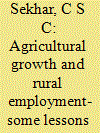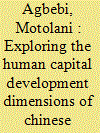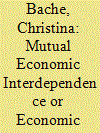| Srl | Item |
| 1 |
ID:
103676


|
|
|
|
|
| Publication |
2010.
|
| Summary/Abstract |
The present paper argues that there is an absence of a clear policy of rural industrialization in India to absorb labour from agriculture that can help increase labour productivity and improve rural incomes. Agricultural growth, combined with clear policy of rural industrialization, is important for an equitable rural-urban growth. To this end, equitable land distribution, rural infrastructure and services, human capital development (literacy and health) and governance are very crucial-in the attainment of all of which China attained a fair degree of success. Therefore, these are some of the lessons that Indian policymakers may take from the Chinese model of rural development.
|
|
|
|
|
|
|
|
|
|
|
|
|
|
|
|
| 2 |
ID:
163605


|
|
|
|
|
| Summary/Abstract |
Saudi Arabia’s economic diversification to date has largely involved “production with rentier characteristics” — a mode of production that relies on oil-driven advantages such as energy- and capital-abundance and foreign labor. The kingdom’s previous attempts to invest in human capital development in order to create labor-intensive sectors for local citizens were hampered by institutional fragmentation in the education sector and the legacy of rentierism. While the current government is integrating the school system and training programs, capacity-building remains the major challenge in building a skilled Saudi workforce.
|
|
|
|
|
|
|
|
|
|
|
|
|
|
|
|
| 3 |
ID:
164380


|
|
|
|
|
| Summary/Abstract |
This article uses a case-study approach to discuss the effects of Chinese economic engagement on three dimensions of human capital development: local employment, training and skill building, and knowledge and technology transfer. The study findings suggests that Chinese economic engagement can and does contribute to human capital development in Africa; however, this is dependent on certain sectoral factors and contextual conditions. This study advances a working hypothesis that the human capital development impact of Chinese economic engagement will vary across countries and sectors of the African economy. This working hypothesis seeks to guide further research towards developing a theoretical framework for the study of Chinese economic engagement in Africa and its effects on human capital development. The article also identifies research areas that should be further explored in order to gain a deeper understanding of the impact of Chinese economic engagement in Africa.
|
|
|
|
|
|
|
|
|
|
|
|
|
|
|
|
| 4 |
ID:
159235


|
|
|
|
|
| Summary/Abstract |
This article concentrates on the deepening of Ankara-Erbil relations, with a specific focus on the presence of the Turkish private sector in the Kurdistan Region of Iraq (KRI) between 2004 and 2014. During that period, the Kurdistan Regional Government (KRG) failed to implement important structural reforms to diversify the economy and ensure economic stability. The absence of a strong local private sector, independent from government-led economic activity, hindered the potential for the region to become completely self-reliant. Due to the liberal economic framework and insufficient government capacity to oversee private sector operations, foreign corporations could operate in the area without deliberately contributing to the long-term socioeconomic development of the KRI. For the viability of South Kurdistan, the KRG must require foreign corporations operating in the KRI to move beyond simple ‘do no harm’ approaches and actively engage in conflict sensitive practices including inclusive business practices, sustainable human resource management, environmental sustainability, human capital development, and social investments.
|
|
|
|
|
|
|
|
|
|
|
|
|
|
|
|